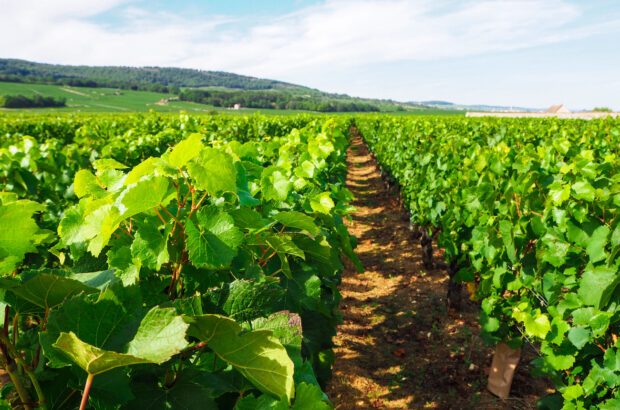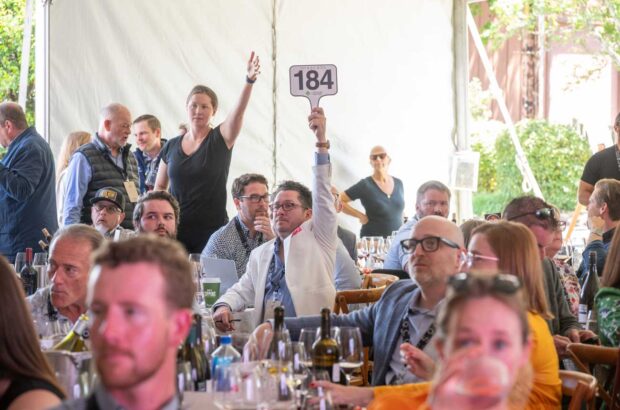Corinne Mentzelopoulos has decided to retire from her position as CEO of Chateau Margaux’s holding company after 43 years in charge, and the reins will now be formally passed to the next generation.
Her son, Alexis Leven-Mentzelopoulos, 30, will take over as head of Château Margaux. He joined the Bordeaux first growth in 2020 as business development director, before being appointed deputy general manager in charge of strategy and development in September 2021.
His sister, Alexandra Petit-Mentzelopoulos, will become president of the holding company’s supervisory board. She has spent the past 11 years as part of the estate team, first as brand ambassador, and then deputy managing director of communication and image since 2016.
Decanter jointly spoke to both Alexis and Alexandra about the new structure and what the future holds for Château Margaux.
‘It’s big news of course, after 43 years of management by my mother,’ Leven-Mentzelopoulos said.
‘Château Margaux was her life and her passion, but recently she’s been a bit less hands-on in some ways on a daily basis, and of course one of our objectives from the very beginning was for it to stay in the family.
‘We’re one of the only ones at this level to be owned by so few family members [some wine estates have a large group of extended family members and other parties as shareholders].’
He added, ‘We have a second sister who is not involved but is also a shareholder, so it’s really the continuation of the family business – my mother will in someway stay involved and continue to be aware of what’s going on because she’s passionate about it, and I’ll be happy to tell her the big news that is going on.’
Leven-Mentzelopoulos said there wouldn’t be any significant changes in the immediate future and confirmed that the existing winemaking and technical teams will remain in place.
‘We have our amazing terroir, which of course stays the same, we have a fantastic technical team, which my mother put in place and which we’ll be relying on – all the team will stay the same. The moment is to respect Château Margaux and to continue to produce a great wine each year.
‘Every management is different and every generation sees things a bit differently, so in that respect this will be a change but the passion of Margaux is the same and as for the quality of the wine, we’ll do everything we can to make sure that stays the same.’
‘There’s a lot of pressure…but it’s a dream come true’
When asked if he feels any pressure taking up the helm at such a young age, he replied: ‘There’s a lot of pressure, it’s a huge amount of responsibility, especially when you’re so young, right? I’m 30 years old, but at the same time, even more than some pressure, it’s determination. I’m very motivated and I feel there’s no choice other than to make it work.
‘Château Margaux needs it, the team needs it, every wine lover that loves Château Margaux wants it to continue to work so well, so of course there’s responsibility, I totally realise that. A lot of things are waiting for me, but it’s a dream come true.’
With the estate at the top of its game in terms of prestige, reputation and wine quality, Leven-Mentzelopoulos finds that although it’s perhaps an easier job than it was in the 1980s, there are still modern-day challenges that will need addressing.
‘The big difference between when my mother took over at 27 years old in 1980 was it was at time when Château Margaux was just emerging from the major economical and qualitative crisis – she had a lot more to do in some ways,’ he said.
‘Every generation has its own dilemmas to deal with’
‘When I inherited it today, it could hardly be in a better state – the wines are amazing, financially people are willing to purchase the wines at expensive prices, so in this sense we’re very privileged, but of course there are some new matters and subjects that will have to be put on the table which my mother didn’t have to deal with.’
Leven-Mentzelopoulos highlighted climate change, sustainability, and being more responsible and respectful of the environment and the impact of production.
He also cited the different style of consumers who might be moving away from high-end wines, plus the emergence and expansion of other wine regions around the world, placing Margaux in a more competitive climate; ‘certain topics that didn’t really exist in the 1980s,’ he said.
‘Every generation has its own dilemmas to deal with. I still feel we’re in a more secure environment compared to what my mother had to deal with in 1980. The idea is not to stand on our laurels, it’s always trying to improve and perfect what can be done, and this is what my mother has always been doing.
‘There’s a big difference between on the one hand, respecting the terroir and understanding that this Château has been here for 500 years and that you should definitely not feel that you’re suddenly arriving and know better than all the previous generations. You’re not here to revolutionise anything, but at the same time you cannot just stay the same and say that the wine is great and it will stay that way.
‘So, it’s about finding the balance between inheriting the knowhow and looking upwards and dealing with the present times. Along with my sister, I am firmly committed to continuing the family objective of making Château Margaux one of the greatest wines in the world.’
Speaking about her new role, Alexandra Petit-Mentzelopoulos said: ‘Alexis will be the one in charge on a day-to-day basis, he will be the one hands-on, and this is something I profoundly support. He’s been doing an amazing job over the last few years and has been much more involved than I’ve been.’
Since becoming a mother of two, Petit-Mentzelopoulos has ‘stepped aside a little’, but ‘a love for Margaux’ meant she wanted to stay involved – albeit in not such a 24-7 capacity.
The role will keep her in the company in a supervisory role, ‘giving support and maintaining a family running things together’, she said.
‘If we can hand the next generation an estate in 30 or 35 years which is as qualitative as it is now, it would be a great success,’ Leven-Mentzelopoulos said. His sister added, ‘We’ve been handed something amazing and transmission is definitely the goal.’
In a press statement sent out by the estate, Corinne Mentzelopoulos said: ‘I am deeply proud to see Alexis take over the reins of a company that I have managed for 43 years. It’s a natural progression in this great family adventure. With Alexandra at his side, his human and operational qualities will enable him to meet the challenges of the future and ensure that Château Margaux retains its position.
‘I have every confidence in the future of Château Margaux because I know that he will be able to continue the tradition of excellence that Château Margaux has maintained for five centuries, in a constant quest for progress and innovation.’
Château Margaux’s rise under the Mentzelopoulos family
The first growth estate was acquired by André Mentzelopoulos in 1977 and passed on to his daughter Corinne soon after, following his sudden death in 1980.
By 1986, it was reported that the money invested in the estate was equivalent to the funds used to buy it, some 70 million francs against a purchase price of 72 million francs.
Alongside a programme to replant vines more than 30 years old, famous Bordeaux wine professor and consultant Emile Peynaud worked for Margaux as an oenologist.
Meanwhile, reportedly on Peynaud’s recommendation, talented young winemaker Paul Pontallier had joined the estate in 1983. The Château Margaux 1983 wine went on to enter Decanter’s hall of fame as a Wine Legend.
A 75% stake in Château Margaux was initially sold in the early 1990s to the Agnelli family of Italy, founder of Fiat and owner of Juventus football club, but Corinne Mentzelopoulos retained full management of the first growth.
The Mentzepoulos family kept a minority stake in the property and subsequently repurchased the estate, becoming sole owner in 2003.
At the time, Decanter contributor Stephen Brook wrote: ‘Corinne Mentzelopoulos has been an impeccable custodian of Château Margaux for decades. She and (managing director) Paul Pontallier have created a golden age for this wonderful estate.
‘I expect wine lovers the world over will be delighted that sole ownership is now in her hands. There couldn’t be a better outcome.’
Paul Pontallier, who had become Château Margaux’s MD in 1990, passed away in 2016 aged 59. He spent his career at the first growth, forging a celebrated working partnership with Mentzelopoulos ‘that has never been surpassed, even by that of Jean-Bernard or Jean-Philippe Delmas with Haut-Brion’, said the late, great wine critic Steven Spurrier in a tribute.
He was succeeded as MD by Philippe Bascaules, who had originally been hired by Pontallier in 1990 as estate director, remaining at Château Margaux for 21 years from 1990 until 2011. Bascaules left to run Francis Ford Coppola’s Inglenook Winery in Rutherford, Napa Valley, where he is still director of winemaking alongside his duties at Margaux.
He will continue in that capacity, supporting Leven-Mentzelopoulos, who is based equally between Bordeaux and Paris, and Alexandra, based in Paris.







